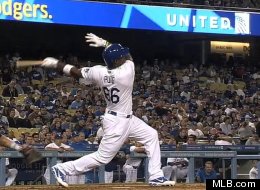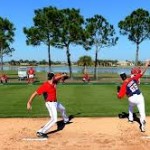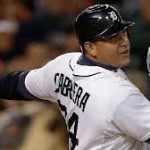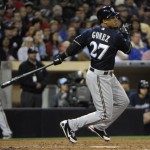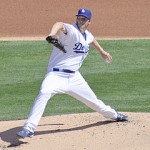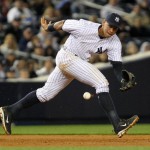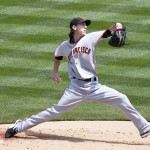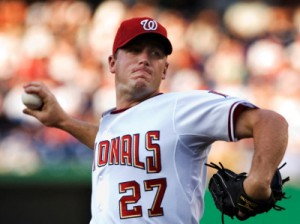
Congrats to Zimmermann on his 2014 all-star selection. Photo dcist.com/(AP Photo/Manuel Balce Ceneta)
Here’s my annual Nationals All Star selection post. As with last year’s post (which also links to subsequent years), I’m including a retrospective on our “illustrious” All Star representative history from years past. If you read on and it sounds familiar, that’s because a lot of it is cut-n-pasted from previous versions of this post. Even so, reading backwards to see who our All-star representatives were in the lean years is an interesting exercise. There were many years that the “one representative per team” rule was bent pretty far in order to include a member of our lousy teams.
Discussion item for the comments: Do you feel that the Major League all-star game should be a collection of the games biggest and best stars year after year, or should it represent who’s having the best current season? I’ll put in my two cents: right now (thanks partly to the one player from each team rule) the rosters are somewhat of a mix of these two philosophies but are leaning more and more towards “who is having the best season.” This year for example, future hall of famers like Albert Pujols are not on the team while 2-month flash in the pans like Charlie Blackmon are. But I feel like a showcase event like the All-Star game needs to highlight the games biggest stars. And I don’t feel like it does.
Keith Law is right: when (to use our local examples) marquee/famous players like Bryce Harper and Stephen Strasburg are not selected in lieu of middle relievers who have a great ERA through 20 innings in the first couple months of the season, it does a disservice to the game. Harper can’t open his mouth without it making national news and he’d be a draw at the game. Same for Strasburg just on fame factor. In this respect I always thought the NBA all-star game did the best job of making its event an actual “All Stars” event. If you want to have an event that rewards players for the best SEASON … then do what the NFL does and have the all-star game after the season. Right now we give all- star spots to guys who have a couple of hot months and who might be hitting .220 again by the end of the season.
The most egregious example of this lately probably was 2012’s Cubs representative Bryan LaHair, who made the all-star game thanks to a scorching first half in 2012. You know where LaHair is now? Chicago *released* him at the end of 2012; what all-star gets released in the season in which they make the team? He played in Japan in 2013 (perhaps why he was released but still indicative of what the team thought of his true talents), hit .230 there, and is currently sitting on Cleveland’s AA roster (having hit .113 for their AAA team and getting demoted). I dunno; is this the kind of “all star” you want to see in your league’s marquee event? I don’t think so; even if Joey Votto is having a down year, I want to see him suit up and not some flash in the pan.
One other quick point. If the season ended today, here’s your playoff teams and the number of players they have in the ASG: NL: Atlanta (3), Milwaukee (4), Los Angeles (4), Washington (1) and San Francisco (2). And AL: Baltimore (3), Detroit (3), Oakland (6), Los Angeles (1) and Seattle (2). Wow; looks to me like both the Nats and the Angels have some serious griping about player selection. The Angels have the 2nd best record in the league and got just one representative (Mike Trout of course).
Anyway, on to the Nats historical representatives.
Here’s a link to the All Star Rosters for 2014, prior to the “last man in” voting and any pending injury replacements.
- Nationals All-Star representative: Jordan Zimmermann (Update post-publishing: Zimmermann strained a bicep, and had to withdraw from the ASG. For a bit it looked like the Nats wouldn’t even have a representative, until Tyler Clippard was named on 7/13/14).
- Snubs: Adam LaRoche, Anthony Rendon, Rafael Soriano, Drew Storen
- Narrative: Zimmermann’s been the best starter on the best pitching staff in the majors this year, and thus earns his spot. I find it somewhat odd that a first place team (or near to it) gets just one representative on the team (as discussed above). Rendon tried to make the team via the “last man in” voting, but historically Nationals have not fared well in this competition (especially when better known players from large markets are in the competition, aka Anthony Rizzo from the Chicago Cubs), and indeed Rendon finished 4th in the last-man voting. LaRoche is having a very good season, almost single handedly carrying the Nats offense while major parts were out injured, but he’s never going to beat out the slew of great NL first basemen (Joey Votto couldn’t even get into this game). Soriano has quietly put together one of the best seasons of any closer in the game; at the time of this writing he has a 1.03 ERA and a .829 whip; those are Dennis Eckersley numbers. But, the farce that is the all-star game selection criteria (having to select one player from each team) means that teams need a representative, and deserving guys like Soriano get squeezed. Then, Soriano indignantly said he wouldn’t even go if named as a replacement … likely leading to Clippard’s replacement selection. The same goes for non-closer Storen, who sports a sub 2.00 ERA on the year. Advanced stats columnists (Keith Law) also think that Stephen Strasburg is a snub but i’m not entirely sure: he may lead the NL in K’s right now and have far better advanced numbers than “traditional,” but its hard to make an argument that a guy with a 7-6 record and a 3.50+ ERA is all-star worthy.
All Star Game Trivia Challenge: Thanks to his 2 month absence, Bryce Harper will not make the 2014 all-star team, thus he drops off as an answer to one of my favorite baseball trivia questions. Prior to this season, Harper had been selected as an all-star in every season in which he has appeared in a game. As far as I can tell in baseball history, there’s now just 4 players in Major League History who can say this. Name them (discuss in comments):
- Nationals All-Star representatives: Bryce Harper, Jordan Zimmermann
- Snubs: Stephen Strasburg, Ian Desmond
- Narrative: Harper comes in 3rd in the NL outfielder voting, ahead of some big-time names, to become only the second Nationals position player elected as an All-Star starter. He was 4th in the final pre-selection vote, so a big last minute push got him the starter spot. Harper also becomes the first National to participate in the Home Run Derby. Zimmermann was 12-3 heading into the game and was on mid-season Cy Young short lists in July in a breakout season. Strasburg’s advanced stats are all better than Zimmermann’s, but his W/L record (4-6 as the ASG) means he’s not an all-star. It also probably doesn’t help that he missed a few weeks. Desmond loses out to Troy Tulowitzki, Everth Cabrera and Jean Segura. Tulowitzki wass having a very solid year and wass a deserving elected starter, while Cabrera and Segura are both having breakout seasons. Desmond was on the “Final vote” roster, but my vote (and most others’ I’m guessing) would be for Yasiel Puig there ([Editor Update: Desmond and Puig lost out to Freddie Freeman: I still wished that Puig finds a way onto the roster but ultimately he did not and I believe the ASG was diminished because of it). Gio Gonzalez, Ryan Zimmerman,and Rafael Soriano are all having solid but unspectacular years and miss out behind those having great seasons.
- Nationals All-Star representatives: Stephen Strasburg, Gio Gonzalez, Ian Desmond, Bryce Harper
- Possible Snubs: Adam LaRoche, Craig Stammen
- Narrative: The two starters Strasburg and Gonzalez were the obvious candidates, and my personal prediction was that they’d be the only two candidates selected. Gonzalez’ first half was a prelude to his 21-win, 3rd place Cy Young season. The inclusion of Desmond is a surprise, but also a testament to how far he’s come as a player in 2012. Harper was a last-minute injury replacement, but had earned his spot by virtue of his fast start as one of the youngest players in the league. Of the “snubs,” LaRoche has had a fantastic come back season in 2012 but fared little shot against better, more well-known NL first basemen. Stammen was our best bullpen arm, but like LaRoche fared little chance of getting selected during a year when the Nats had two deserving starters.
- Nationals All-Star representatives: Tyler Clippard
- Possible Snubs: Danny Espinosa, Michael Morse, Drew Storen, Jordan Zimmermann
- Narrative: While Clippard was (arguably) the Nats best and most important reliever, I think Zimmermann was a more rightful choice. He was 10th in the league in ERA at the time of the selections and has put in a series of dominant performances. Meanwhile Espinosa is on pace for a 28homer season and almost a certain Rookie-of-the-Year award (though a precipitous fall-off in the 2nd half cost him any realistic shot at the ROY), and perhaps both players are just too young to be known around the league. Lastly Morse is certainly known and he merited a spot in the “last man in” vote sponsored by MLB (though he fared little chance against popular players in this last-man-in voting).
- Nationals All-Star representatives: Matt Capps
- Possible Snubs: Adam Dunn, Josh Willingham, Ryan Zimmerman, Steven Strasburg
- Narrative: Capps was clearly deserving, having a breakout season as a closer after his off-season non-tender from the Pirates. The 3-4-5 hitters Zimmerman-Dunn-Willingham all had dominant offensive seasons as the team improved markedly from its 103-loss season. But perhaps the surprise non-inclusion was Strasburg, who despite only having a few starts as of the all-star break was already the talk of baseball. I think MLB missed a great PR opportunity to name him to the team to give him the exposure that the rest of the national media expected. But in the end, Capps was a deserving candidate and I can’t argue that our hitters did anything special enough to merit inclusion.
- Nationals All-Star representatives: Ryan Zimmerman
- Possible Snubs: Adam Dunn
- Narrative: The addition of Dunn and Willingham to the lineup gave Zimmerman the protection he never had, and he produced with his career-best season. His first and deserved all-star appearance en-route to a 33 homer season. Dunn continued his monster homer totals with little all-star recognition.
- Nationals All-Star representatives: Cristian Guzman
- Possible Snubs: Jon Rauch
- Narrative: The first of two “hitting rock-bottom” seasons for the team; no one really merited selection. Zimmerman was coming off of hamate-bone surgery in November 2007 and the team was more or less awful across the board. Rauch performed ably after Cordero went down with season-ending (and basically career-ending) shoulder surgery. Guzman’s selection a great example of why one-per-team rules don’t make any sense. Guzman ended up playing far longer than he deserved in the game itself by virtue of the 15-inning affair.
- Nationals All-Star representatives: Dmitri Young
- Possible Snubs: Ryan Zimmerman, Shawn Hill (though I wouldn’t argue for either)
- Narrative: Young gets a deserved all-star appearance en route to comeback player of the year. Zimmerman played a full season but didn’t dominate. Our rotation featured 6 primary starters, none of whom are still in the league now, though Hill showed flashes of dominance throughout the year.
- Nationals All-Star representatives: Alfonso Soriano
- Possible Snubs: Nick Johnson, Ryan Zimmerman
- Narrative: Soriano made the team as an elected starter, the first time the Nats have had such an honor. Our pitching staff took massive steps backwards and no starter came even close to meriting a spot. Cordero was good but not lights out as he had been in 2005. Soriano’s 40-40 season is a poster child for “contract year” production and he has failed to come close to such production since. The team was poor and getting worse. Johnson had a career year but got overshadowed by bigger, better first basemen in the league (a recurring theme for our first basemen over the years).
- Nationals All-Star representatives: Livan Hernandez, Chad Cordero
- Possible Snubs: Nick Johnson, John Patterson.
- Narrative: The Nats went into the All Star break surprisingly in first place, having run to a 50-31 record by the halfway point. Should a first place team have gotten more than just two representatives? Perhaps. But the team was filled with non-stars and played far over its head to go 50-31 (as evidenced by the reverse 31-50 record the rest of the way).
